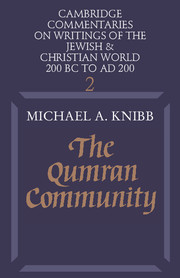Summary
The Qumran writings include a number of works that are poetic or liturgical in character, such as the Psalms Scroll from Cave 11 or the Words of Blessing. The former work (11QPsa) contains not only forty-one biblical psalms, but also seven apocryphal psalms and a piece in prose about David's compositions (11QPsa DavComp); four of the apocryphal psalms were known already, but three are ‘new’. The combination within the same collection of biblical and apocryphal psalms is to be observed. The latter work (1QSb) – copied out, like the Rule of the Congregation (1QSa), in the same manuscript as the Community Rule (1QS) as an appendix – consists of a series of blessings that were to be pronounced by ‘the wise leader’ (Hebrew maskīl; see above, pp. 96, 118); he was to bless in turn all the members of the community, the high priest, the priests, and the prince of the congregation. It appears that this work was intended for use in the messianic age, and that the blessings for the high priest and the prince were for the figures referred to elsewhere as the messiahs of Aaron and Israel. But this work may also have been used in the liturgical services of the community in anticipation of the messianic age. However, the most important of the poetic and liturgical writings consists of a collection of psalms of thanksgiving (Hebrew hōdāyōt), often referred to in English as the Hymns.
- Type
- Chapter
- Information
- The Qumran Community , pp. 157 - 182Publisher: Cambridge University PressPrint publication year: 1987

